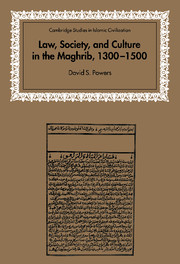Book contents
- Frontmatter
- Contents
- List of figures and tables
- Preface
- Introduction
- 1 Kadijustiz or Qāḍi-Justice? A Paternity Dispute from Fourteenth-Century Morocco
- 2 From Almohadism to Mālikism: The Case of al-Haskūrī, the Mocking Jurist, ca. 712-716/1312–1316
- 3 A Riparian Dispute in the Middle Atlas Mountains, ca. 683-824/1285–1421
- 4 Conflicting Conceptions of Property in Fez, 741–826/1340–1423
- 5 Preserving the Prophet's Honor: Sharīfism, Sufism, and Mālikism in Tlemcen, 843/1439
- 6 On Judicial Style: Two Fatwās on Tawlīj (ca. 880/1475)
- Conclusion: The Muftī
- Bibliography
- Index of Qur'ānic Verses
- Index of Prophetic Ḥadīth
- Index of Names
- Subject index
4 - Conflicting Conceptions of Property in Fez, 741–826/1340–1423
Published online by Cambridge University Press: 05 July 2014
- Frontmatter
- Contents
- List of figures and tables
- Preface
- Introduction
- 1 Kadijustiz or Qāḍi-Justice? A Paternity Dispute from Fourteenth-Century Morocco
- 2 From Almohadism to Mālikism: The Case of al-Haskūrī, the Mocking Jurist, ca. 712-716/1312–1316
- 3 A Riparian Dispute in the Middle Atlas Mountains, ca. 683-824/1285–1421
- 4 Conflicting Conceptions of Property in Fez, 741–826/1340–1423
- 5 Preserving the Prophet's Honor: Sharīfism, Sufism, and Mālikism in Tlemcen, 843/1439
- 6 On Judicial Style: Two Fatwās on Tawlīj (ca. 880/1475)
- Conclusion: The Muftī
- Bibliography
- Index of Qur'ānic Verses
- Index of Prophetic Ḥadīth
- Index of Names
- Subject index
Summary
Do not spend two consecutive nights without your last will and testament being written and placed underneath your pillow.
(prophetic ḥadīth)The words of the founder [of an endowment] are like the words of the Divine Lawgiver.
(Moroccan Jurist)In this chapter we will examine a case in which two families living in Fez became embroiled in a dispute over a familial endowment created a generation after the appearance of the Black Death. The dispute raised the question of how it was possible to know the intent of the founder of the endowment many years after he or she had died. The qāḍī hearing the case sought the advice of two distinguished muftis. Frustrated by their line of reasoning, the plaintiff, himself a Jurist, used his knowledge of the law to exploit an irregularity in the witnessing clause of the original endowment deed. In this manner, the case was reduced to two contradictory Claims that were resolved through the imposition of an oath. In this instance, the oath appears to have been an effective means for eliciting the truth and resolving the dispute.
The Black Death
Originating in Central Asia in 739/1338-39, the Black Death raced across Eurasia, in the next two years reaching the Middle East, North Africa, and Europe. The epidemic followed established trade routes. Borne on merchant ships and trade caravans, it jumped from one urban center to the next. In 748/1347 it reached Cairo and from there spread to Sicily and Tunisia in 749/1348.
- Type
- Chapter
- Information
- Law, Society and Culture in the Maghrib, 1300–1500 , pp. 141 - 166Publisher: Cambridge University PressPrint publication year: 2002



